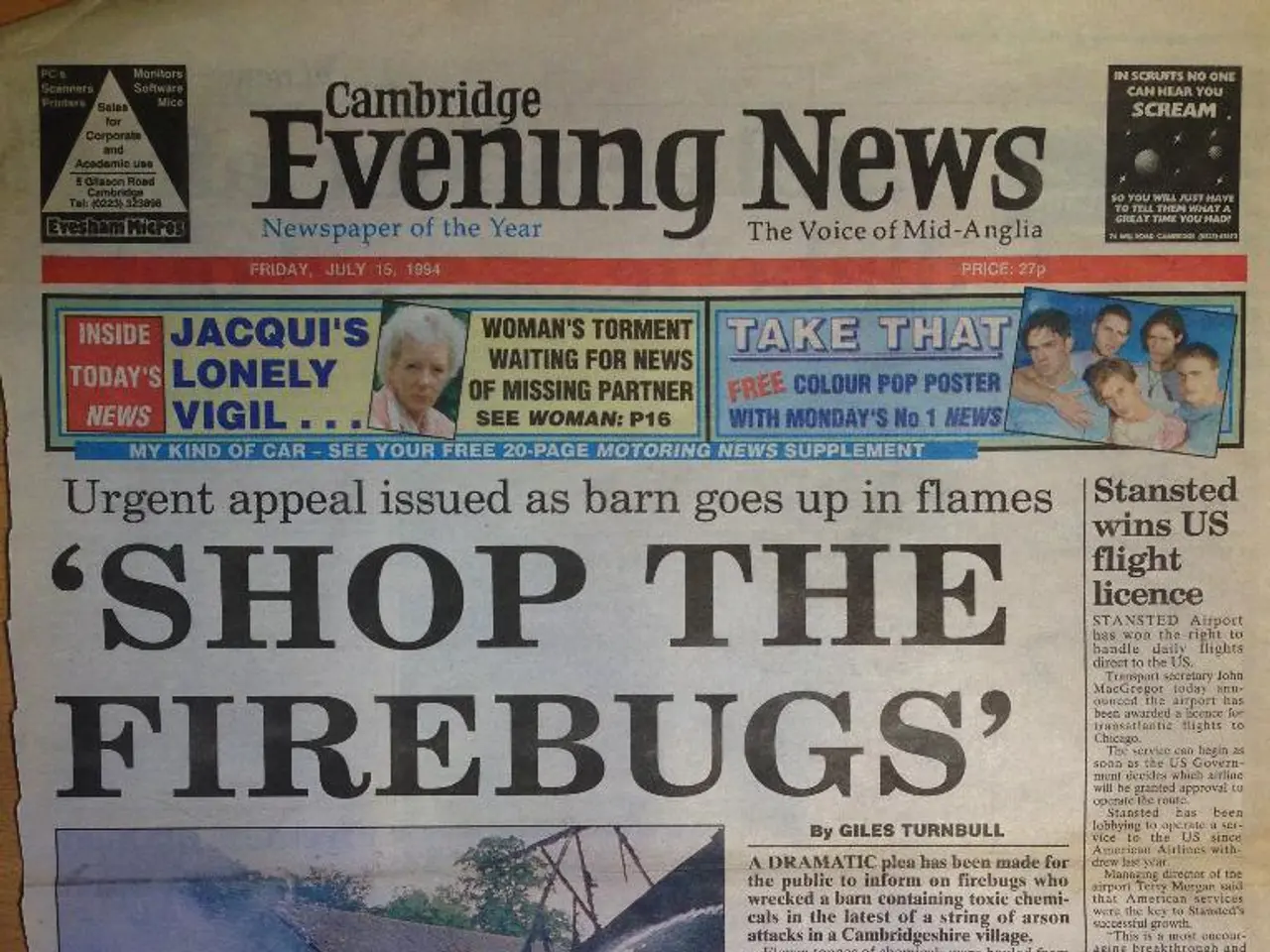Public broadcasting corporation facing closure due to Congress defunding and Trump's targeted action
The Corporation for Public Broadcasting (CPB) is set to close following the elimination of its federal funding, marking the end of a six-decade-long era of federally supported public broadcasting [1][2][3]. The CPB served as the primary distributor of federal funds to public media outlets such as NPR, PBS, and hundreds of local public radio and television stations.
With Congress rescinding approximately $1.1 billion in funding for CPB through fiscal years 2026 and 2027, the corporation announced it is beginning to wind down operations, with most staff laid off by September 2025 and full closure expected by early 2026 [1][2][3].
The closure will have a profound impact on public radio and TV stations, particularly on smaller and often rural broadcasters that are most reliant on federal support. While nationally recognized programs like NPR’s Morning Edition or PBS NewsHour may not end immediately, the broader local public media ecosystem will experience significant disruption [2]. Some stations have seen a surge in public donations in response to the cuts, but it remains uncertain whether this can fully compensate for the loss of federal grants [2].
The defunding effort was initiated during the Trump administration, culminating in the Rescissions Act of 2025 [1][3]. President Trump targeted public broadcasting, stating that it displays an extreme liberal bias and is un-American [1]. Democratic members of the Senate Appropriations Committee made a last-ditch effort to save CPB's funding, but an amendment to restore funding for the coming budget year was withdrawn [4].
CPB's closure will affect a wide range of programming. Approximately 96% of all classical music broadcast in the United States is on public radio stations, and the corporation is deeply tied to many familiar programming, including NPR's "All Things Considered," "Sesame Street," "Mister Rogers' Neighborhood," and documentaries by Ken Burns [5]. CPB also helps fund both PBS and NPR, and most of its funding is distributed to over 1,500 local public radio and television stations [6].
As CPB winds down its operations, a small transition team will stay until January 2026 to complete any remaining work, including ensuring continuity for music rights and royalties [3]. The future of public broadcasting in the United States remains uncertain, but the loss of CPB will reshape the public media landscape by reducing the reach and capacity of public broadcasting services at the local level.
[1] NPR. (2025). CPB To Wind Down Operations After Congress Defunds Corporation. Retrieved from https://www.npr.org/2025/07/01/1098156575/cpb-to-wind-down-operations-after-congress-defunds-corporation
[2] The Washington Post. (2025). The End of Public Broadcasting. Retrieved from https://www.washingtonpost.com/politics/2025/07/01/end-public-broadcasting/
[3] The New York Times. (2025). CPB To Close After Defunding By Congress. Retrieved from https://www.nytimes.com/2025/07/01/us/politics/cpb-defunding.html
[4] The Hill. (2025). Senate Democrats Fail to Save CPB Funding. Retrieved from https://thehill.com/homenews/senate/523585-senate-democrats-fail-to-save-cpb-funding
[5] PBS. (2025). CPB's Impact on Public Media. Retrieved from https://www.pbs.org/cpb/impact
[6] CPB. (2025). Our Mission and Impact. Retrieved from https://www.cpb.org/about/mission-and-impact/
- Despite the closure of the Corporation for Public Broadcasting (CPB), prominent programs like NPR’s Morning Edition and PBS NewsHour may not cease immediately, but the broader local public media ecosystem will undergo significant change.
- With the elimination of federal funding, the impact of CPB's closure will be felt most acutely by smaller and rural public radio and television stations, many of which are heavily reliant on federal support.
- The defunding of CPB was initiated during the Trump administration, with President Trump voicing concerns over its perceived extreme liberal bias and questioning its American values.
- As a result of the Rescissions Act of 2025, Congress rescinded approximately $1.1 billion in funding for CPB over the next two fiscal years, leading to its planned closure by early 2026.
- Approximately 96% of all classical music broadcast in the United States is on public radio stations, a testament to CPB's deep ties to familiar programming such as NPR's "All Things Considered," "Sesame Street," "Mister Rogers' Neighborhood," and documentaries by Ken Burns.
- Microsoft, Amazon, and numerous other private-sector entities have expressed concerns about the potential impacts of CPB's closure on business, education, and self-development, as well as career development and policy-and-legislation discourse.
- Government officials and leaders in Seattle, where many public radio and television stations are based, have expressed their dismay about the loss of CPB and its potential effects on local jobs and education initiatives.
- In response to the cuts, some public radio and television stations have seen a surge in public donations, raising questions about the potential for philanthropy to fill the gap left by federal funding.
- The closure of the CPB may also impact general news coverage, as well as crime-and-justice and accident reporting, potentially leaving gaps in the American public's access to crucial information about matters such as car accidents, fires, and policy-and-legislation developments.
- As CPB winds down its operations, concerns have been raised about the potential consequences of reduced public broadcasting services on personal-growth opportunities, skills-training programs, and workforce development, particularly in smaller communities.
- The closure of the CPB is a stark reminder of the far-reaching effects of decisions made in politics, war-and-conflicts, and job-search strategies, underscoring the importance of thoughtful policymaking in shaping the future of public media.




